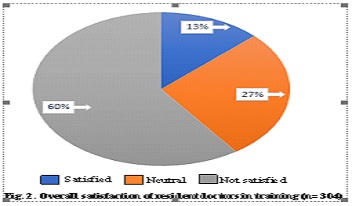Assessing Satisfaction of Resident Doctors with Training in Northwestern Nigeria
Keywords:
Residency Training, Resident Doctors, Satisfaction, NigeriaAbstract
Background: Residency training is a postgraduate medical education where graduate doctors are mentored by qualified specialists in specific fields in hospital settings. Satisfaction in residency training is found to be interrelated with performance and quality of life of resident doctors. Numerous literatures have assessed satisfaction using various parameters with significant proportion of doctors not satisfied with their jobs. The literatures reviewed mostly measured satisfaction as a consequence associated with factors, thus difficult to generalize findings. This study therefore aims to assess satisfaction of resident doctors in training in Northwestern Nigeria using multiple parameters
Objectives: To assess intrinsic, extrinsic and overall satisfaction of resident doctors in training as well as associated factors.
Methods: Electronic questionnaire was distributed to respondents using online links to respondents' emails or personal contacts. Data was collected within a span of two weeks.
Results: A total of 304 respondents filled and submitted the questionnaire. The mean age was 34.70 ± 4.50 years, with Male: Female ratio of 2.54: 1.00, 244 (80.3%) married and 216 (71.1%) Junior registrars. Only 39 (12.8%) of respondents were satisfied overall with residency training. On bivariate Chi square analysis, there was no significant association between overall satisfaction and sociodemographic and residency training characteristics of respondents. However, significant variables that were associated with overall satisfaction include: life in residency training being more stressful than life before; written/considered writing international licensing exams; residency training meeting expectations of respondents; and desire to quit residency training for practice in Europe or United States. There was also significant association between faculty of respondents and overall satisfaction. On multivariate logistic regression, only; written/considered writing international licensing exam; residency training meeting expectations of respondents; and faculty of respondents were significantly associated with overall satisfaction.
Conclusion: The level of satisfaction amongst resident doctors in training was very poor.

Downloads
Published
License
Copyright (c) 2021 SS Umar, ZS Babandi, AG Suleiman, UM Umar, AA Olorukooba, AJ Ahmad, BO Muhammad, IU Abubakar, A Ahmad

This work is licensed under a Creative Commons Attribution-ShareAlike 4.0 International License.




